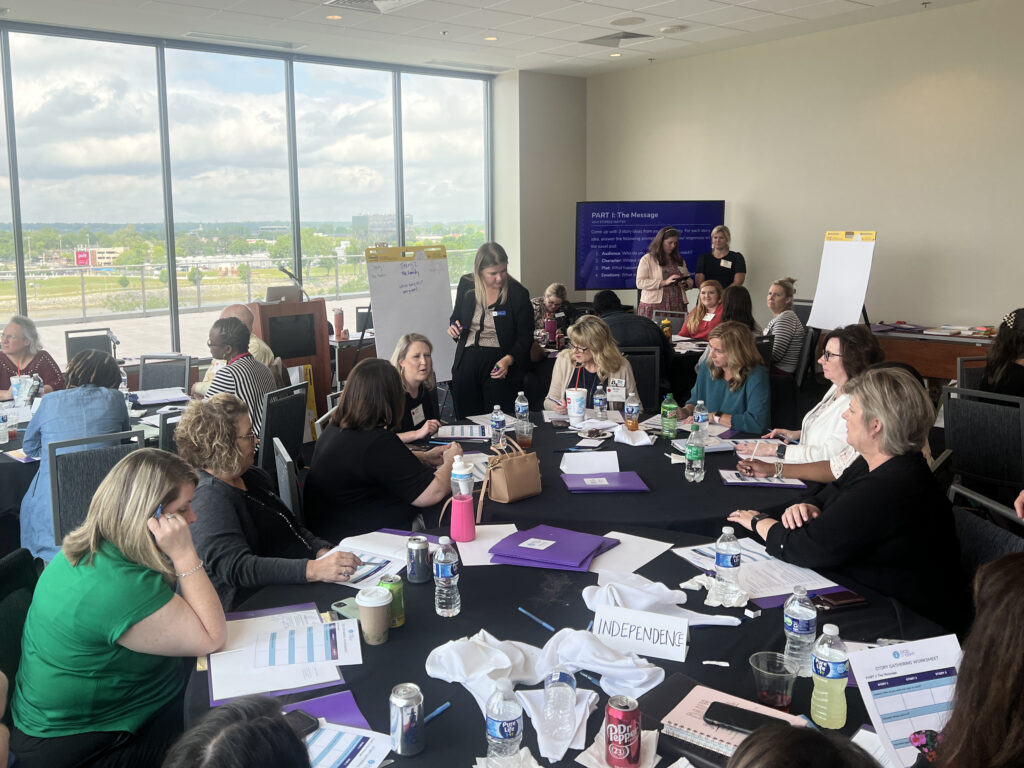Excel by Eight hosted its semiannual Learning Community at the end of April, bringing together more than 50 people from its six communities to share network connections, celebrate accomplishments, and discuss resources that can move their local community development plans forward and help children thrive.
During the two-day, immersive event, participants from Conway County, Independence County, Jefferson County, Little Rock, Sevier County, and Union County also unpacked the LEARNS Act with state officials and learned about maternal health as a key priority in prenatal-to-eight initiatives.

Dr. Emma Pengelly, director of philanthropy at Ingeborg Initiatives, delivered the keynote address at the Learning Community on Thursday, April 27. Ingeborg Initiatives, led by Olivia Walton, has collaborated with Every Mother Counts, led by Christy Turlington Burns, to highlight women’s health in Arkansas. A new documentary titled Giving Birth in America: Arkansas came out of both leaders’ commitment to changing the reality for birthing women in the United States.
During her keynote, Pengelly showed the trailer for the film and spoke about the importance of ensuring all mothers have the right to a healthy pregnancy, safe birth, and support during their baby’s first year of life. The maternal mortality rate in Arkansas is nearly twice the national average, and 90% of those deaths are preventable.

“A college-educated Black woman is three times more likely to experience severe maternal complications than a white woman without a high school education,” Pengelly said. “There are racial disparities that we cannot ignore. That being said, outcomes for birthing moms in Arkansas are not great across all races and ethnicities.”
Pengelly cited preterm births as an example. According to the March of Dimes, Arkansas is one of the worst states for preterm births, with one in eight babies – or 12% – being born preterm in 2021. Additionally, more than half of all births in Arkansas are covered under Medicaid, but postpartum coverage for these new mothers only lasts for 60 days after childbirth.
“Around 60-70% of women don’t make their first postpartum visit, giving them only 18 days to fit in an appointment so as to not miss that window,” Pengelly said.
“We need both policy changes and practical actions on the ground to get to Arkansas-specific, sustainable solutions.”
In addition to the keynote, participants heard from state officials about implementation of the LEARNS Act, an omnibus law signed by Gov. Sarah Huckabee Sanders earlier this year. The legislation raises the minimum starting salary for teachers, introduces major new policies related to school choice, reinforces existing laws related to literacy, and calls for the creation of an early childhood education system.
Tonya Williams, director of the Division of Child Care and Early Care and Education (DCCECE), discussed the pieces of the LEARNS Act that impact early childhood from birth to age 4. DCCECE will move from the Department of Human Services to the Department of Education later this year. Williams emphasized the importance of having early childhood educators at the table during this transition, referring to the rulemaking work groups for LEARNS. These groups will be able to provide input on assessments systems and tools.


Tonya Williams (left), director of the Division of Child Care and Early Care and Education, and Stacy Smith (right), deputy commissioner at the Division of Elementary and Secondary Education, discussed the LEARNS Act at the Spring 2023 Learning Community.
“The goal is to have an early childhood education system that is coordinated and integrated across all programs and related agencies, regardless of funding source,” Williams said. “After decades of collaboration, Arkansas has some amazing things to build on. I think we’ll be able to work with what we have, but it may mean tweaking and changing some things. And that’s where these early learning workgroups will be able to have input.
“We need to hear from the end users and the teachers of infants and toddlers,” she said.
Stacy Smith, deputy commissioner at the Division of Elementary and Secondary Education at the Department of Education, discussed the aspects of the LEARNS Act that will impact kindergarten through 12th grade, particularly when it comes to literacy and early intervention.
“We currently have fragmented screening tools and no clear guidance on at what point we can identify that a child needs access to learning services,” Smith said. “This gives us an opportunity to streamline some things.”
As part of LEARNS, students who do not meet the third-grade reading standard by the 2025-26 school year will not be promoted to fourth grade. Smith said retention policies change adult behavior, leading to proactive intervention before retention and access to 90 minutes of literacy instruction every day for students who are held back.
“The plan is intensive intervention early on through screeners, providing high-quality instruction and access to high-quality teachers to all students,” Smith said.
Excel by Eight’s six communities will come together again in the fall. To learn more about E8’s work in building local models for change across the state, visit excelby8.net/e8-communities.
To stay updated about our continued efforts to create a reliable resource grid – one in which all families and communities are plugged in to ensure that all children have what they need to thrive – sign up for our newsletter or follow us on Facebook and Twitter.
